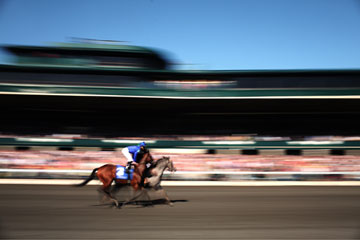
At Keeneland, a premier track in Lexington, Ky., the stakes can run to $750,000.
(2 of 5)
Other sports have also lost some of their audience: ratings for NBA championship games are well off their historic highs, for example, and boxing has lost its grip on the American imagination. People have more entertainment options than ever before, and most slices of the pie are getting smaller. But the Thoroughbred-racing business faces such a wide array of challenges that it is reasonable to ask whether the sport will keep shrinking until it is gone or all but gone, as vestigial as polo. Just keep shrinking until--like that postage stamp of history hidden beneath a sleepy traffic island--little remains but the memories.
Squeezed on the Rail
To understand Horse racing's predicament is no simple matter, because what looks at first glance like one business is actually at least four distinct but entangled enterprises. Each one faces its own set of problems and sees its own solutions. And while a change in one enterprise will send ripples through the others, these factions have a poor record when it comes to making decisions together.
First, there is the business of breeding and training racehorses. This tightly controlled world, governed by the Jockey Club's registry, lives and dies by the fortunes of a relatively small number of champion stallions. Ounce for ounce, the semen of prized studs is among the most expensive substances on the planet, but it carries no guarantees. Most foals never make it to the winner's circle. The average owner gets into the game knowing that he is likely to lose money. To improve his chances at this fool's endeavor, he chases the richest bloodlines in hopes of winning a big purse, thus driving up stud fees for the tiny number of champions.
"Even in today's smaller industry, we are producing around 25,000 foals per year, and only a tiny percentage of those will ever win a graded stakes race," breeder Ted Simendinger told me recently. "Only one will win the Derby. We're selling dreams." And those dreams are more and more expensive, which explains why Simendinger, a small operator, left the business a while back. He tells me of "a buddy who has bred over 250 stakes winners--he's out of it now." He tells me that "it's almost impossible to make money" as an honest breeder. He tells me that cost pressures on breeders too often translate into pressure on trainers to win purses by doping the horses. In short, it just became too hard--and too unseemly--to keep going.
Of course, racing's high costs and long odds are nothing new. It is no accident that the most important man in the sport right now is arguably the Emir of Dubai, with stables of horses across four continents; being superrich has always been an advantage in this game. But even wealthy people like to finish first. Winners bring prestige, they collect prize money, and they command the highest stud fees.
According to some experts, these economic realities encourage breeders to favor horses that are flashy-fast but short on resilience. A small number of wins at ages 2 and 3 can send a horse off to a long and happy retirement. Consider Bernardini, winner of the 2006 Preakness Stakes. The Emir sent him straight from the winner's circle to a stable in Kentucky, where he earns his owner $150,000 per mating. Being a flash in the pan is now very good business. But it doesn't breed excitement.
